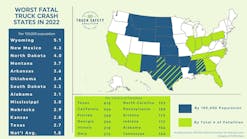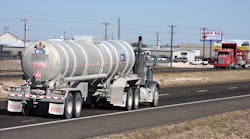National Tank Truck Carriers and the American Trucking Associations have requested that the Federal Motor Carrier Safety Administration provide all hazardous materials drivers with the same exemption from the 30-minute rest break requirement that was given to drivers handling explosives.
Under the new July 1 hours of service rule (HOS), drivers moving Division 1.1, 1.2, and 1.3 explosives are exempted from the 30-minute rest break requirement. While exempt, those drivers are still forbidden from doing any work aside from assuring the cargo’s integrity.
All other drivers (including hazmat drivers) must take the rest break time as off duty. Being off duty, they must be relieved of all responsibilities and be free to leave the truck (and its cargo) unattended.
Following implementation of the latest hours of service, NTTC and ATA contacted FMCSA about how this issue negatively relates to the vast majority of hazmat carriers, according to Dan Furth, NTTC president. “We asserted that since explosives haulers get this exemption, surely they could see that bulk loads of gasoline and poisonous by inhalation (PIH) materials should fall within the same regulatory realm,” he said. “In addition to the general safety issues surrounding unattended hazmat, many carriers have appropriately included constant attendance into their hazmat security plans. There may also be implications for Responsible Care program compliance as well.”
On July 15, NTTC and ATA met with FMCSA to discuss the merits of granting this exemption to the entire hazmat motor carrier industry. “Based on that meeting, we submitted a request for an interpretation that the activities necessary to maintain constant attendance do not constitute enough company control to move a driver from off duty to on duty (not driving) status,” Furth said. “FMCSA staff indicated that they would be receptive to such a request. We are optimistic that they will extend some level of relief. They have also received several other exemption requests from such entities as the concrete mixers and the Department of Defense’s Surface Distribution Deployment Command.”
As guidance, such relief would be permanent. Unlike FMCSA’s exemption for trucks hauling cargo for the Department of Energy, interpretive guidance is not subject to a two-year renewal period. Barring a new interpretation, the guidance would be effective indefinitely.
“However, should we receive this relief, NTTC and ATA have also indicated to FMCSA that we intend to submit a rulemaking petition that would expand the constant attendance exception to the hours of service from just Division 1.1-1.3 explosives to cover all hazardous materials,” Furth said.
In a recent letter, ATA and NTTC asked that FMCSA interpret their definition of off-duty time to allow drivers to continue exercising constant attendance of hazmat loads, provided the driver does not perform any other work that would require the driver to log his time as being on duty.









